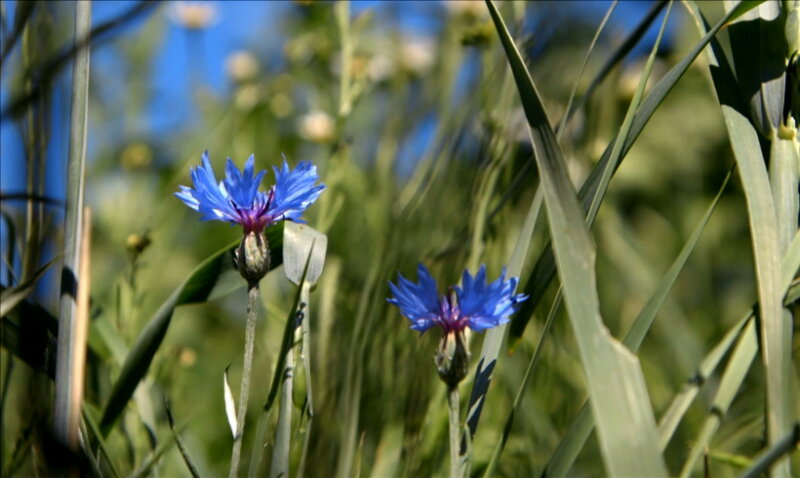the general standards for organic agriculture,
specifies EU-standardized minimum requirements for agricultural products and food of vegetable and animal origin,
and regulates the labelling of products and the procedures for monitoring holdings and companies.
Biolabel for companies in the agricultural and food sector
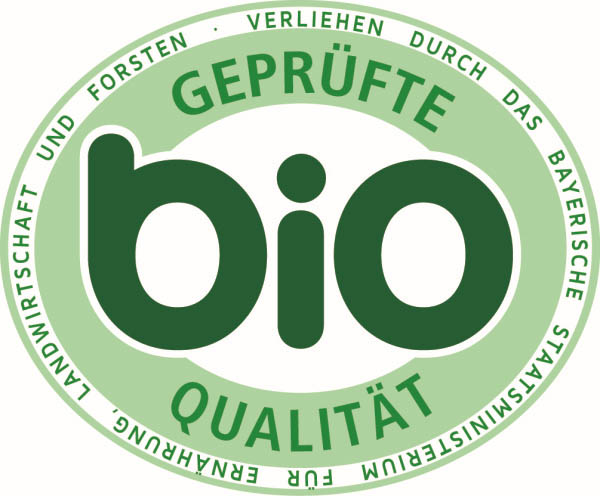
The biolabel awarded by the Free State of Bavaria offers companies in the farming and food sector in the European Union the opportunity to label goods produced in compliance with the terms of the EU-Eco Regulation in combination with higher quality criteria. The precisely defined regulations are a guarantee for the consumers of an economic system in harmony with nature and provide them with guidance when making their purchases. Both the farmers of organic products as well as the producers must fulfil the demanding inspection criteria and allow their products to be checked by state-approved and monitored inspection boards. The defined control system ensures a complete traceability of the products over the entire lifecycle.
products and services over and beyond the statutory standards
a three-tier control system
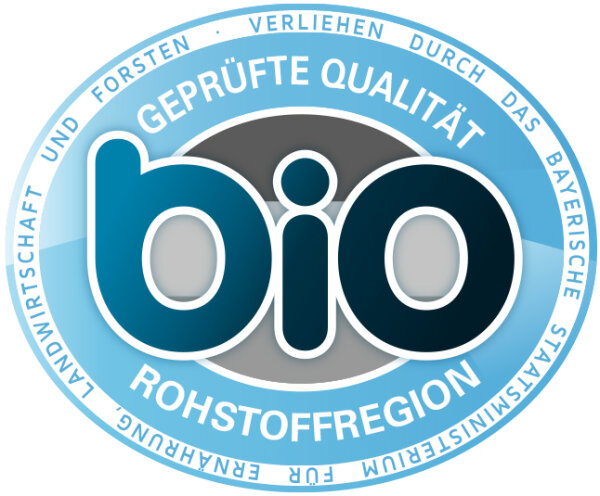
In cases in which the products of a certain provenance (e.g. Bavaria) made according to the higher quality criteria can be tracked along the whole path from their production, via their processing, all the way to the shop counter, they can be given a biolabel stating the corresponding indication of geographical origin. In this case the origin is presented both in the form of a corresponding logo as well as the colours of the state of origin in the inner oval.
products and services over and beyond the statutory standards
a three-tier control system
a full certificate of origin
For further information
The participating producers from the member states of the European Union must run their entire agricultural operations (vegetable and animal products) on the basis of the EU-Eco Regulation.
The agricultural crop land must be planted with at least 20% legumes in crop rotation.
In the summer, major parts of the basic ration of ruminants must consist of green fodder. Feeding ruminants with silage fodder alone is not permitted.
For pigs and poultry, the following upper limits for livestock per hectare apply:
Stalls for porkers: 10
Laying hens: 140
Broiler chickens: 280
Pullets: 280
Fattened ducks: 210
Fattened turkeys: 140
Fattened geese: 280
Breeding sows: 6.5
Piglets: 74
No use of fresh, dried, or composted poultry droppings, no purchase of liquid animal excrements (slurry, liquid manure etc.) from external conventional-farming sources.
Use of composted or fermented household waste only upon presentation of additional organic-quality-assurance criteria.
No use of products or by-products of animal origin for fertilization, exceptions: hoof meal, hair meal, horn meal.
Purchase of organic fertilizers from external sources restricted to max. 40 kg N/ha; exceptions: horticulture and permanent crops.
When copper products are used, the active-ingredient volume must be restricted to max. 3 kg per hectare and year (hop cultivation max. 4 kg per hectare and year).
In vegetable cropping no use of soilless cultivation methods, exception: sprout production.
At least 50% of the animal feed must be produced on the own farm or in defined feed/manure exchange programmes (exception: small producers: livestock under 1,000 laying chickens, 30 breeding sows, 60 porker stalls, 10 horses).
At the present moment there are no officially recognized biolabels in conjunction with certificates of origin.
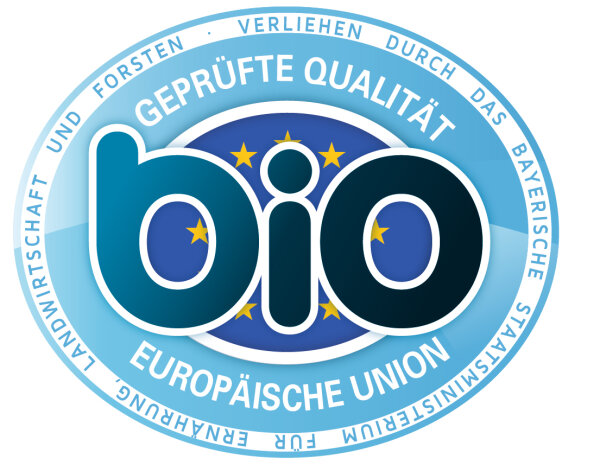
In general, all companies in the farming and food sector in the European Union are entitled to apply for the biolabel. Hence the following examples are also conceivable for the biolabel with certificate of origin: The product has been made according to the provisions of the EU-Eco Regulation in combination with higher quality criteria of the “biolabel”; in addition all stages of the production of the raw materials, via their processing, all the way to the shop counter have taken place within the member states of the “European Union”.
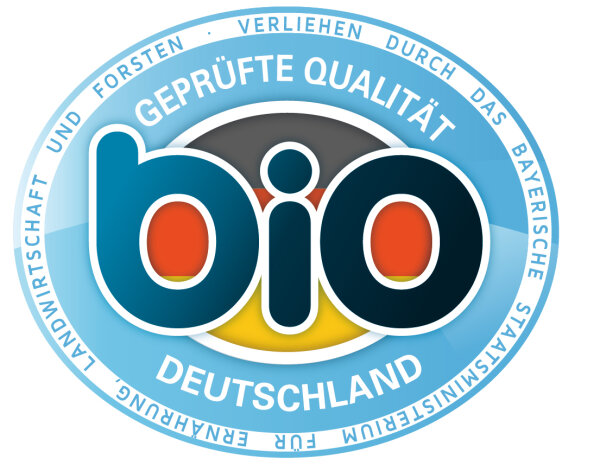
The product has been made according to the provisions of the EU-Eco Regulation in combination with higher quality criteria of the “biolabel”; in addition all stages of the production of the raw materials, via their processing, all the way to the shop counter have taken place within “Germany”.
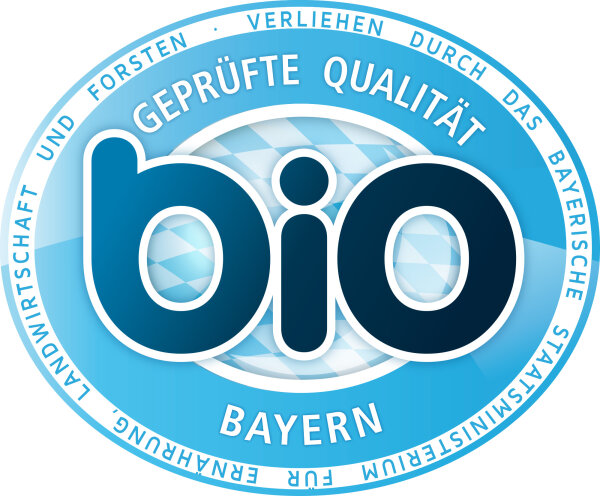
The product has been made according to the provisions of the EU-Eco Regulation in combination with higher quality criteria of the “biolabel”; in addition all stages of the production of the raw materials, via their processing, all the way to the shop counter have taken place within “Bavaria”.
Sponsor of the label
The sponsor of the “biolabel” system is the Free State of Bavaria, represented by the Bavarian Ministry of Food, Agriculture, and Forestry. The symbol sponsor has the final decision regarding the issue of licenses and the approval of quality and test specifications.
Licensee
Licensees issue the right to use the label to companies within the European Union in the farming and food sector and in the food retail trade (label users). The biolabel may be used only by those holdings that have concluded a label usage agreement with the licensees. Licensees of the biolabel can include organizations, associations, or federations within the European Union in the farming and food sector who are able to ensure the implementation of the tests required as per the provisions of the programme and the compliance with the specified provisions.
Biolabel Programme Provisions (in preparation)The licensees also coordinate the necessary controls to be carried out at the sites of the label users and other programme participants. For this purpose they commission independent certification bodies to inspect the holdings regarding their compliance with the programme requirements and the proper legal use of the label.
Parties interested in becoming a recognized licensee can send a written application to the sponsor of the label:
Bayerisches Staatsministerium für Ernährung, Landwirtschaft und Forsten Referat M 1 Ludwigstraße 2 80539 Munich Germany The licensees currently approved are:
- Name:
- Landesvereinigung für den ökologischen Landbau in Bayern e.V. (LVÖ)
- Adresse:
- Landsberger Str. 527 81241 München
- Telefon:
- 089 4423190-0
- E-Mail:
- info@lvoe.de
- Fax:
- 089 4423190-29
- Name:
- Landwirtschaftliche Qualitätssicherung Bayern (LQB) GmbH
- Adresse:
- Max-Joseph-Straße 9 80333 München
- Telefon:
- 08139 9368-35
- E-Mail:
- info@lq-bayern.de
- Fax:
- 08139 9368-57
Label users
Companies in the farming and food sector as well as companies in the food retail trade within the member states of the European Union are entitled to use the biolabel on their organic products subject to the condition that
the provisions of the programme are fulfilled, and
the company has concluded a label usage agreement with a licensee officially recognized by the label sponsor.
The use of the label to identify the holding or the company is not permitted. Companies interested in using the biolabel can send a written application to one of the officially recognized licensees for the label.
No licensees have yet been given official recognition.
Before granting the right to use the label for the first time, the licensee or the certification body commissioned by him runs
tests on the products of the applicant for fulfilment of the programme provisions and
an inspection of the company/holding
as measures to confirm the company’s/holding’s eligibility to use the label. If the applicant fulfils the programme provisions, the right to use the label is awarded to him/her in the form of a certificate of confirmation.
System control
As a measure to ensure the neutrality and objectivity of the programme organization and the controls, the licensees and the certification bodies are closely monitored by the “Bayerische Landesanstalt für Landwirtschaft” (LfL, Bavarian State Research Institute for Agriculture), acting as a neutral state authority. The system control also acts as an independent point of contact for anonymous reports and complaints. All relevant controls carried out in other member states of the European Union are officially recognized and do not require additional appraisal by the Landesanstalt für Landwirtschaft (LfL).

